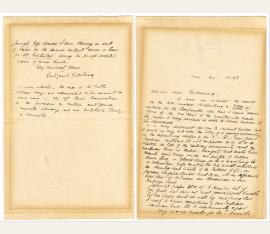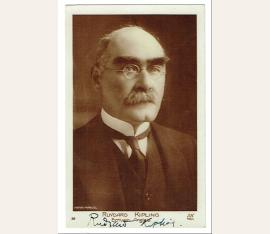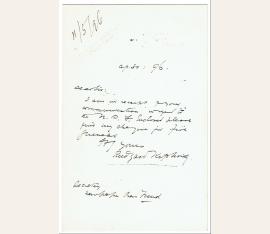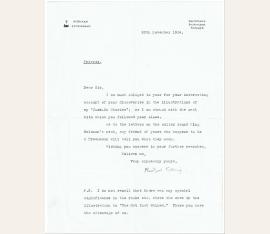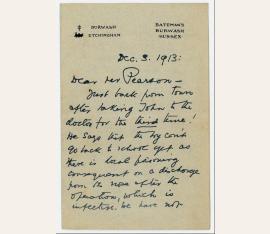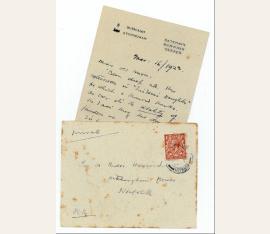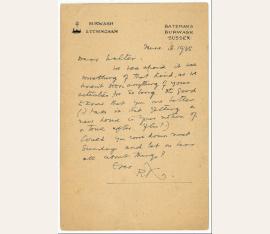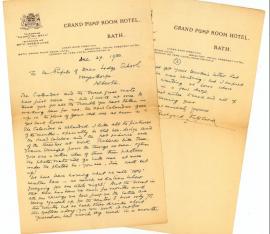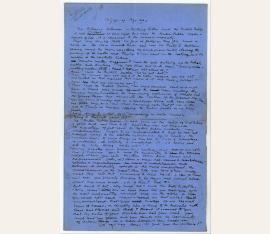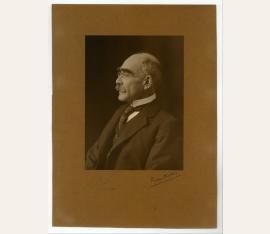Engl. Schriftsteller und Nobelpreisträger (1865-1936). ALS Vermont. 8vo. 2 Seiten.
$ 6,946 / 6.500 €
(54458)
To the American author William H. Rideing (1853-1918): "[...] I am in receipt of yours of the 18th instant suggesting a 2000-2500 w[ord] article for the Companion. Now that I have seen some of the mothers of the youths who read the paper I may perhaps be able to come nearer to its demands. It is very difficult for me to invent notions but I find in my notebooks the story of a young apprentice in the repairing shops of the E.I.R. [East Indian Railways] our Great Indian railroad. We will suppose he is 18 or 19 - sketch the life of the railway community and a railway town in India (Bengal) and make him mend and bring in, on one piston, a broken down loco.
in flood time, as he is travelling to a volunteer rifle match. The tale would introduce the country-bred white of the Indian RR's - a parsee engine driver and so on - all the difference that there is between an American + an Indian line. I should prefer 3500 w[ords] to turn in but if you find that does not meet your approval kindly let me know and we will try something else. I used to know something of our Indian railway line. It’s community apart. Very many thanks for Sir E[dwin] Arnolds Jungle Life series. I am doing a set of tales on the same subject more or less for St Nicholas, giving the Jungle people’s views of mankind [...]“. - Kipling's works of fiction include "The Jungle Book" (a collection of stories which includes "Rikki-Tikki-Tavi"), the "Just So Stories" (1902), "Kim" (1901), and many short stories, including "The Man Who Would Be King" (1888). His poems include "Mandalay" (1890), "Gunga Din" (1890), "The Gods of the Copybook Headings" (1919), "The White Man's Burden" (1899), and "If—" (1910). He is regarded as a major innovator in the art of the short story; his children's books are enduring classics of children's literature; and one critic described his work as exhibiting "a versatile and luminous narrative gift". Kipling was one of the most popular writers in England, in both prose and verse, in the late 19th and early 20th centuries. In 1907, he was awarded the Nobel Prize in Literature, making him the first English-language writer to receive the prize, and its youngest recipient to date..
Engl. Schriftsteller und Nobelpreisträger (1865-1936). Portraitpostkarte mit eigenh. Unterschrift bildseitig. o. O. u. D. 140 : 90 mm.
$ 1,923 / 1.800 €
(81731)
Hübsches Portrait, den Kopf leicht zur Seite gewandt. Photographie: Henri Manuel. Mit dem gedr. Zusatz „Ecrivain Anglais“. Selten.
Engl. Schriftsteller und Nobelpreisträger (1865-1936). Eigenhändiger Brief mit Unterschrift. Naulakha. 8vo. 1 p. Blindgeprägter Briefkopf “Telegrams and Express, Brattleboro” und “Naulakha, Waite, Vermont”. Doppelblatt.
$ 1,282 / 1.200 €
(83375)
Begleitschreiben zu einem “cheque for five Guineas” für den “Newspaper Press Fund” (?). – Oben links offensichtlich mit dem handschriftlichen Vermerk des Eingangsdatums “11/5/96”. – Leicht gebräunt, sonst sehr gut.
English poet and novelist, Nobel laureate (1865-1936). Typed letter signed. Sussex. 4to. 1 p. Printed letterhead. Expected folds. With envelope.
$ 1,923 / 1.800 €
(94219)
Kipling's letter to D. Avery in London. He is responding to an enquiry regarding illustrations in the “Just So Stories”: “Dear Sir, I am much obliged to you for your interesting account of your discoveries in the illustrations of my “Just-So Stories”; as I am struck with the zeal with which you followed your clues. As to the letters on the collar round King Solomon’s neck, any friend of yours who happens to be a Freemason will tell you what they mean. Wishing you success in your further searches, Believe me, Very Sincerely yours, Rudyard Kipling.
P.S. I do not recall that there was any special significance in the rocks etc. above the cave in the illustration to “The Cat that Walked”. There you have the advantage of me." Avery’s response to Kipling's letter is as follows: "Dear Sir, Please accept my thanks for your kind letter. I am enclosing a rough tracing taken from the illustration of the “Cat that Walked” to indicate the outlines that suggested to me grotesque monsters devouring female figures – the waistband, skirt & foot indicating the one, and the back, part of upper of arm, waistline & part of skirt indicating the other figure. I thought you might be interested in seeing the foundation on which my imagination had built. Again thanking you for your Kindness, Believe me, Yours sincerely….” Avery was a chemical consultant who lived and worked in Australia, but visited London in 1924 in an attempt to persuade British papermakers to use Eucalypts in their pulping processes. It was presumably during his time in London that this letter was written. An interesting letter, providing insight into Kipling's motivations for the illustrations in Just-So. Included: A copy of Avery's original letter to Kipling, dated Nov 25th 1924..
English poet and novelist (1865-1936). Autograph letter signed. Bateman's, Burwash, Sussex. 03.12.1913. 8vo. 3½ pp. (54 lines) on embossed folded sheet.
$ 2,992 / 2.800 €
(49579/BN34018)
To John Pearson, the house master of his son John (known as "Jack") at Wellington College. John had not been well through much of 1913 and Kipling is seeking advice after another trip to the doctor: "Just back from town after taking John to the doctor for the third time! He says that the boy can't go back to school yet as there is local poisoning consequent on a discharge from the nose after the operation, which is infective. We have not been able to get rid of this trouble and I hope to take him up again on Friday [...]".
English poet and novelist (1865-1936). Autograph letter signed. Bateman's, Burwash, Etchingham and Sussex. 16.03.1929. Small 8vo. 1½ pp. With autogr. envelope.
$ 3,206 / 3.000 €
(62302/BN45496)
"Dear old mon | Been deep all this afternoon in 'Wisdom's Daughter' for which a thousand thanks. As for its 'the vitality of the I am' thing that dumbfounds me. I've been enjoying a set-back of about a fortnight - or you'd have heard from me long ago. I'm better now, but nothing to sing about - yet. Can you come for lunch next Tuesday? [...] I'd dearly love to see you. Ever |Rudyard." - On headed paper. - From the collection of Diana Herzog.
English poet and novelist (1865-1936). Autograph letter signed (RK"). Bateman's, Burwash, Sussex. 03.06.1935. 8vo. 1 p.
$ 908 / 850 €
(62368/BN45613)
To Walter Creighton: "We were afraid it was something of that kind, as we haven't seen anything of your activities for so long. It's good to know that you are better [...]". - Walter Creighton (1878-1958) was a son of Mandell Creighton, Bishop of London, and Louise Creighton, "who was one of Robert von Glehn's daughters. He gave up training to be a doctor to train as a singer; he gave the first performance of Vaughan Williams's Songs of Travel in 1904 and also had a minor career as an actor. After various personal crises, he served with distinction in the First World War, and was awarded the Military Cross.
He developed into an excellent organiser, and in 1924 organised the Pageant of Empire at Wembley Stadium; in 1934, he devised and organised the Pageant of Parliament at the Royal Albert Hall. In after years, he moved to Antibes" (Valerie Langfield: Roger Quilter. His Life and Music. Woodbridge, The Boydell Press, 2002, p. 287). - On headed paper..
English poet and novelist, Nobel laureate (1865-1936). Autograph letter signed. Grand Pump Room Hotel, Bath. 27.12.1933. 8vo. 1½ pp. on 2 ff.
$ 2,672 / 2.500 €
(72692/BN46691)
To the Pupils of Deer Lodge School, Mayerthorpe, Alberta. Kipling thanks the students profusely for the custom-made calendar and placemats they sent him. He also discusses the difficulties the extreme weather conditions and their effect upon the 75 head steers on his property (Bateman's, a 17th-century house located in Burwash, East Sussex, where Kipling lived from 1902 to his death in 1936). Signed "Rudyard Kipling". - From the Collection of Diana Herzog.
English poet and novelist, Nobel laureate (1865-1936). "Things as they are". Autograph manuscript. No date. Folio (321 x 200 mm). 3½ pp. on 4 ff. Autograph emendations and cancellations in black ink, editorial annotations in pencil and pink ink in another hand (each of the first three leaves in two pieces and repaired with thick tape).
$ 16,029 / 15.000 €
(87355/BN57844)
An intriguing autograph manuscript by Kipling for a satirical short story. Written to be published in the Pall Mall Gazette, "Things As They Are" never appeared there and is not published in any of the collected editions of Kipling's work. Kipling recounts the details of a conversation between "That very terrible deity The God of things as They are" and the British public, imagined here as a teething kitten, on the failure of most artists to truly grasp the beauty of the world around them. - The manuscript was written by Kipling for the Pall Mall Gazette under the condition that his name not be attached to it; the editor, Harry Cust, refused to grant this anonymity, so Kipling declined to have it published.
Rudyard Kipling was just one of the literary luminaries enticed to join the ranks of contributors to William Waldorf Astor's Gazette under the editorship of Harry Cust, who transformed the publication into one of the best respected evening journals of the time after his appointment in 1892; alongside Kipling, it featured work from H. G. Wells, Algernon Swinburne, Jack London, and Joseph Conrad. The manuscript was probably written between 1892 and 1896: Kipling writes on the same theme in an article published by The Times on 20 August 1892 entitled "Half-a-Dozen Pictures", and by 1896 Cust had ceased to edit the Gazette..
English poet and novelist, Nobel laureate (1865-1936). Portrait photograph signed. No place. Sepia photograph mounted on mat, 320 x 237 mm. With Kipling's signature in fountain pen on the mount below photograph.
$ 9,083 / 8.500 €
(92358/BN61608)
Photographic portrait signed on the matting by its subject Rudyard Kipling, the English novelist, short-story writer, journalist, political actor, and winner of the 1907 Nobel Prize for literature, best remembered for "The Jungle Books". - The photographer's mount features the blindstamp of the photography studio: "J. Russell Photographer" with its Baker Street address below. The Russell studio was known for portraits of famous individuals of the day, from artists to heads of state. By middle age, Kipling had already won his Nobel Prize and was his work was famous across the English-speaking world. - Signature bright and clear, very well preserved.
sold
E. Brief mit U.
Autograph ist nicht mehr verfügbar
Rudyard Kipling (1865–1936), Schriftsteller. E. Brief mit U. Wohl Waite (Vermont), 2. Juli 1896. 1¾ SS. auf Doppelblatt. 8°. Mit e. adr. Kuvert. – An Captain Richard Trench Kirkpatrick (1865–1898) in Tipperary, der ihm die Anfrage eines jungen Lesers seines „Dschungelbuchs“ und ebenso ein von diesem verfaßtes Gedicht über Mowgli weitergeleitet hatte: „[...] I am always very much interested in the workings of a child’s mind (having two of my own) and I can sympathize with your young mans irritation (noble and poetic) [...] Give him my best salaams and tell him to sing his things out loud to himself if he wants to make them fit [...]“. – Kiplings berühmtes „Jungle Book“ war 1894 erschienen, „The Second Jungle Book“ im Jahr darauf. Captain Kirkpatrick diente im 100. Regiment (Royal Canadians) und starb 1898 während einer Expedition in Dufile (Uganda). – Auf Briefpapier mit gepr. Adresse und stellenweise (in den unbeschriebenen Teilen) unbedeutend fleckig.

